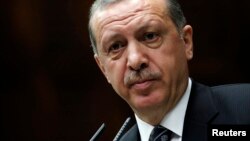ISTANBUL —
Turkish Prime Minister Tayyip Erdogan on Saturday hailed the planned withdrawal of Kurdish rebel fighters from Turkey as the end of a "dark era"' but warned against potential sabotage of a historic peace process.
The Kurdistan Workers' Party (PKK), which seeks autonomy for Turkey's Kurdish southeast, on Thursday ordered its fighters in Turkey to begin withdrawing to its main base in the mountains of northern Iraq under a carefully choreographed peace plan.
The withdrawal, due to begin on May 8, follows months of negotiations between Turkish intelligence officers and Abdullah Ocalan, the PKK's jailed leader, to try to end hostilities after the bloodiest fighting in a decade erupted in June 2011. More than 40,000 people, mainly Kurds, have died in the conflict since 1984.
"The door is closing on a dark era. Turkey is changing its ill fortune and is entering a new phase," Erdogan told a business group in comments broadcast live by state television, his first since the withdrawal was announced.
"No one should try to pull this process in a different direction," he added. "We remain vigilant against sabotage, against provocations, but today we are much more hopeful, determined and optimistic."
Some 2,000 PKK rebels are set to retreat in small groups in a process that will take months and is to be monitored by Turkish intelligence on one side and the Kurdish regional government in Iraq on the other.
The withdrawal is a significant advance in a process offering the best chance in more than a decade of ending a conflict that has blotted Turkey's human rights record and stunted economic growth.
Yet nationalists have slammed the jailhouse negotiations with Ocalan, who is serving a life sentence for treason, arguing that it means surrender to the demands of "terrorists."
Others have asked what the government has promised Ocalan in return for a PKK withdrawal.
Erdogan's government is now expected to tackle some of the political reforms sought by Kurds, including constitutional changes on citizenship, changes to anti-terrorism laws and broader Kurdish cultural and political rights.
Since sweeping to power 10 years ago, Erdogan has ushered in major changes for Turkey's estimated 14 million Kurds, especially in allowing more use of the Kurdish language, which was completely banned until two decades ago.
But his government has also clamped down on Kurdish political activity, jailing thousands of elected officials, journalists, academics, activists and others from the main Kurdish opposition during trials that are taking years to complete.
The Kurdistan Workers' Party (PKK), which seeks autonomy for Turkey's Kurdish southeast, on Thursday ordered its fighters in Turkey to begin withdrawing to its main base in the mountains of northern Iraq under a carefully choreographed peace plan.
The withdrawal, due to begin on May 8, follows months of negotiations between Turkish intelligence officers and Abdullah Ocalan, the PKK's jailed leader, to try to end hostilities after the bloodiest fighting in a decade erupted in June 2011. More than 40,000 people, mainly Kurds, have died in the conflict since 1984.
"The door is closing on a dark era. Turkey is changing its ill fortune and is entering a new phase," Erdogan told a business group in comments broadcast live by state television, his first since the withdrawal was announced.
"No one should try to pull this process in a different direction," he added. "We remain vigilant against sabotage, against provocations, but today we are much more hopeful, determined and optimistic."
Some 2,000 PKK rebels are set to retreat in small groups in a process that will take months and is to be monitored by Turkish intelligence on one side and the Kurdish regional government in Iraq on the other.
The withdrawal is a significant advance in a process offering the best chance in more than a decade of ending a conflict that has blotted Turkey's human rights record and stunted economic growth.
Yet nationalists have slammed the jailhouse negotiations with Ocalan, who is serving a life sentence for treason, arguing that it means surrender to the demands of "terrorists."
Others have asked what the government has promised Ocalan in return for a PKK withdrawal.
Erdogan's government is now expected to tackle some of the political reforms sought by Kurds, including constitutional changes on citizenship, changes to anti-terrorism laws and broader Kurdish cultural and political rights.
Since sweeping to power 10 years ago, Erdogan has ushered in major changes for Turkey's estimated 14 million Kurds, especially in allowing more use of the Kurdish language, which was completely banned until two decades ago.
But his government has also clamped down on Kurdish political activity, jailing thousands of elected officials, journalists, academics, activists and others from the main Kurdish opposition during trials that are taking years to complete.





